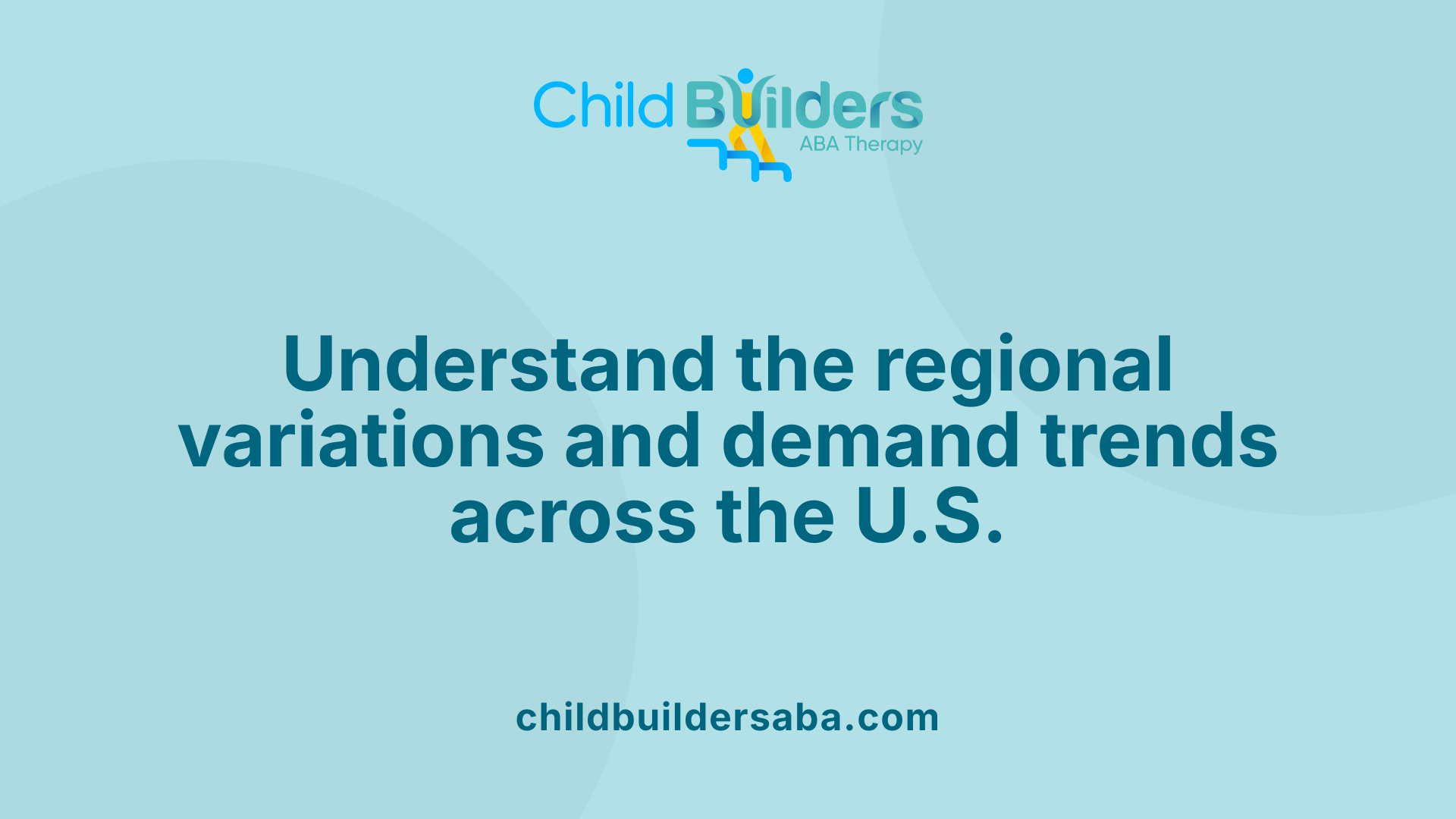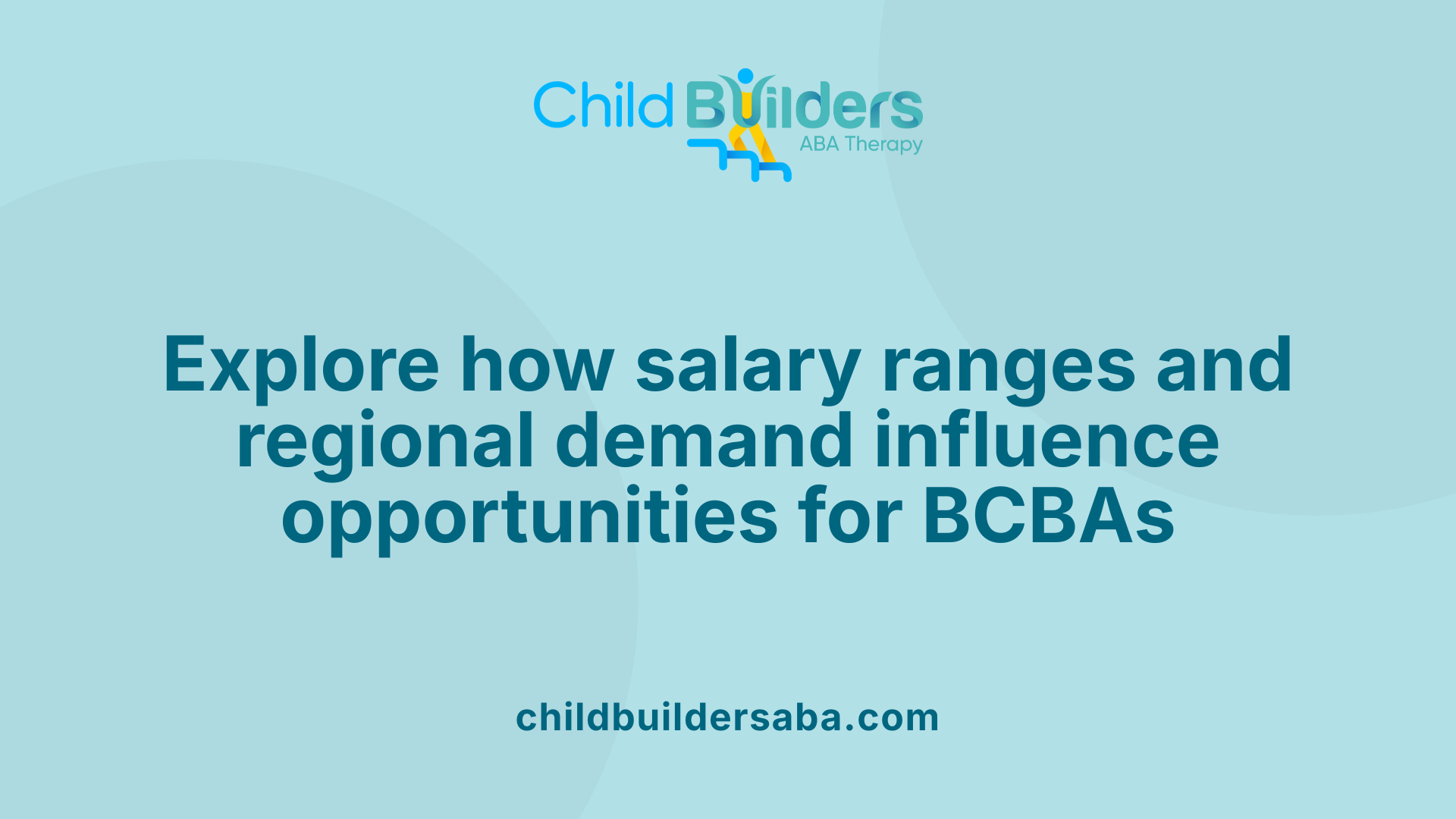The Rate of Job Growth for BCBAs

Understanding the Growing Demand for BCBAs
The profession of Board Certified Behavior Analysts (BCBAs) is experiencing unprecedented growth, driven by increased awareness of the effectiveness of Applied Behavior Analysis (ABA) therapy, especially for autism spectrum disorder (ASD). The rising demand has led to a significant increase in employment opportunities, regionally and nationally, reshaping the landscape of behavioral health services and offering promising career prospects.
Current Job Growth Rate for BCBAs
What is the current job growth rate for Board Certified Behavior Analysts (BCBAs)?
The employment outlook for BCBAs remains optimistic, with a projected growth rate of around 8% from 2020 to 2030, according to the Bureau of Labor Statistics. This figure surpasses the overall average growth rate for all occupations, which is approximately 5%.
Recent data show a steady increase in demand for these professionals. In particular, there was a 14% rise in annual demand from 2022 to 2023. Geographic areas like Oregon, Kansas, and New Hampshire have experienced notable increases in BCBA jobs, reflecting growing regional needs.
The number of online job postings for BCBAs in 2023 hit 65,300, almost equal to the total number of certified clinicians. This indicates a highly active and expanding job market, further bolstered by increasing recognition of Applied Behavior Analysis (ABA) as an effective intervention.
Legislative support and rising autism spectrum disorder diagnoses fuel this upward trend. The demand for BCBAs has been growing approximately 14% each year in recent periods, highlighting a strong and sustainable industry.
Overall, prospects for employment in this field are very favorable. Opportunities are growing across the country, and salaries are competitive, reflecting the high demand for qualified behavior analysts.
Regional Employment Trends and Demand Dynamics

What are the employment trends and demand for BCBAs across different regions?
The demand for Board-Certified Behavior Analysts (BCBAs) has experienced a remarkable rise across various regions, driven by increased recognition of ABA (Applied Behavior Analysis) therapy's effectiveness, especially for autism spectrum disorder (ASD). Over the past few years, the number of BCBA job postings has tripled, reaching over 103,000 in 2024. This indicates a highly dynamic and expanding job market.
Regionally, states like California, Texas, Florida, Massachusetts, and New Jersey stand out as key hubs for BCBA employment. California leads with approximately 19% of all job postings, reflecting its large population and extensive autism services infrastructure. Major cities within these states—such as Berkeley, Redwood City, and Mojave—are known for offering some of the highest salaries, further attracting professionals.
Demand varies significantly by location, and some counties still face shortages of qualified BCBAs. Despite these disparities, many regions are making efforts to expand access to behavioral health services, which continues to increase employment opportunities.
States that have expanded health coverage through Medicaid and other insurance programs have seen significant growth in BCBA employment, as these policies facilitate service delivery and support. The overall outlook remains very positive, with employment projections predicting a 20-22% annual growth rate over the next decade.
What are some popular states and cities for BCBAs?
| State | Notable Cities | Approximate Demand Share | Salary Range | Additional Notes |
|---|---|---|---|---|
| California | Berkeley, Redwood City, Mojave | 19% of postings | Up to $95,532 in top cities | Hub with high salaries and demand |
| Massachusetts | Boston, Worcester | High demand | About $80,000–$90,000 | Strong autism services sector |
| Texas | Houston, Dallas, Austin | Growing demand | $70,000–$90,000 | Rapid population expansion |
| Florida | Miami, Tampa, Orlando | Rapid growth | $70,000–$85,000 | Medicaid expansion aiding demand |
| New Jersey | Newark, Jersey City | High demand | Up to $95,000 | Competitive salaries and robust industry |
How is the field expanding into various settings?
BCBAs are increasingly working in diverse environments beyond traditional clinics. Schools, homes, and community settings now frequently employ behavior analysts to provide tailored interventions. This expansion ensures that children and individuals with ASD receive support in environments that best suit their needs.
The growth in employment opportunities across multiple settings underscores the versatility of BCBA roles. As awareness and diagnosis of ASD rise, professionals find opportunities in public education, healthcare facilities, and even private practices, making the field more accessible and impactful.
Final insights
The trend of growth is expected to sustain, driven by ongoing developmental and healthcare policies, as well as the proven effectiveness of ABA therapy. While demand remains high nationwide, regional disparities highlight areas for further development. For professionals considering a career in this field, the future looks promising, with plentiful jobs and competitive salaries across the United States.
Future Outlook and Market Projections

What are the future job market projections for board-certified behavior analysts?
The outlook for board-certified behavior analysts (BCBAs) remains very optimistic. Over the next decade, employment growth is projected to range from 8% to as high as 22% depending on the specific source and industry sector. This strong growth reflects widespread recognition of ABA’s effectiveness in treating autism spectrum disorder and other developmental disabilities.
Demand has surged significantly in recent years. From 2020 to 2024, the number of job postings for BCBAs has risen from around 34,000 to over 103,000 — a notable increase that points to a thriving industry.
Regions like California, Massachusetts, Texas, Florida, and New Jersey are experiencing particularly rapid growth, with some areas reporting demand increases of over 200%. This trend indicates a geographic distribution aligned with population needs and healthcare infrastructure.
The expansion isn’t limited to traditional healthcare settings. Opportunities are growing in emerging sectors such as telehealth services, digital therapy platforms, and community outreach programs. These new sectors are expanding access and providing more diverse employment options.
As awareness and government support continue to grow, BCBAs can expect not only steady job security but also competitive salaries and chances for career advancement. Specializations, research roles, and leadership positions are increasingly accessible as the field evolves.
Overall, the job market for BCBAs is projected to remain strong with increasing opportunities across industries and locations, reflecting a broad and sustained industry expansion.
Salary Trends, Regional Differences, and Job Prospects

How are salary trends and regional differences affecting BCBAs' employment prospects?
The outlook for BCBAs is increasingly positive, with upward trends in salaries and expanding regional opportunities. Nationally, the median annual wage for behavior analysts sits around $73,616 as of March 2025, with the average ranging between $74,000 and $90,500. As experience, education, and specialization grow, so does earning potential, with some professionals reaching salaries up to $120,000.
Regional differences significantly influence income levels. For example, high-cost areas like Massachusetts, Hawaii, and parts of New Jersey often pay BCBAs over $100,000 annually, especially in urban centers such as Boston, Honolulu, and Newark. California, particularly cities like Berkeley, Redwood City, and Mojave, is also home to top salaries, averaging around $90,556.
Demand across various states supports these salary variations. In 2020, California, Massachusetts, Texas, Florida, and Georgia experienced the highest demand for BCBAs, which correlates to higher salary offers. The highest-paying states, including New Jersey and Wisconsin, offer median wages above $90,000.
The growth in demand for ABA services—driven by greater recognition of ABA effectiveness and increases in autism diagnoses—has led to a surge in job opportunities. From 2010 to 2018, demand for BCBAs skyrocketed by 1,942%, and from 2021 to 2022, a further 23% increase was observed.
Furthermore, employment prospects are bolstered by strong industry growth. The field's projected job growth of 22% over the next decade surpasses most other occupations, making BCBA careers appealing for stability and upward mobility.
Specialized roles, like travel BCBAs, also offer lucrative salaries, ranging from $74,000 to over $132,500 annually, depending on hours and location. Those working in private practice or healthcare generally enjoy higher earnings, whereas non-profit and government roles may offer slightly lower figures.
In summary, BCBAs’ salaries are trending upward, with regional disparities largely due to demand and living costs. As the industry continues to expand and diversify, employment opportunities and income potential are set to increase, particularly in high-demand cities and states.
Career Growth and Opportunities in ABA
What are the employment prospects and career growth opportunities for BCBAs in the field of Applied Behavior Analysis (ABA)?
The outlook for BCBAs is very promising, with a notable growth rate of about 22% projected over the next decade. This expansion is driven by increased recognition of ABA as an effective intervention for autism spectrum disorder (ASD) and other developmental disabilities, along with rising ASD diagnoses worldwide. As of 2023, there are over 40,000 BCBAs globally, highlighting a significant rise in demand.
The job market for BCBAs is thriving across all states in the United States. From 2010 to 2018, demand grew by an astonishing 1,942%, and it continues to rise strongly, including a 58% increase in demand from 2023 to 2024. In particular, states like California, Massachusetts, Texas, New Jersey, and Florida have seen the highest demand, with salaries in prominent cities ranging from approximately $78,853 to over $88,573 by 2030.
Career opportunities extend beyond traditional clinical roles. BCBAs can advance into leadership positions such as Clinical Supervisor, Program Director, or even create their own private practice. Many work in diverse settings, including schools, healthcare organizations, government agencies, and private businesses. Salaries are competitive, with average annual wages around $89,075 in 2025, and higher in some states and industries, especially in private practice and healthcare sectors.
Leadership roles are growing, allowing experienced BCBAs to oversee large teams, develop new programs, and influence policy. Additionally, BCBAs interested in research can join academic institutions or specialized organizations, contributing to ongoing advances in ABA treatment methods.
Furthermore, specialization within ABA, such as focusing on autism, organizational behavior management, or research, offers avenues for professional growth and increased earning potential. Higher education—such as Master’s or Doctorate degrees—can lead to salaries reaching up to $120,000 or more.
Overall, the field presents a rewarding path for those committed to making a positive impact. Continued professional development, involvement in research, and community engagement are vital for career advancement. Given the current trends and projected growth, a career as a BCBA not only offers stability but also ample opportunities for specialization, leadership, and making meaningful contributions to individuals and communities.
Impact of Legislation and Insurance Coverage on Job Market

How are salary trends and regional differences affecting BCBAs' employment prospects?
Salaries for Board-Certified Behavior Analysts (BCBAs) are generally on the rise, reflecting strong job growth and increased demand. The national average salary ranges from approximately $73,000 to $85,000 annually, with opportunities for higher earnings as professionals gain experience or pursue advanced degrees.
Regional differences play a significant role in earning potential. States with high demand and higher living costs, such as Massachusetts, Hawaii, and parts of New Jersey and Maryland, often offer salaries exceeding $100,000, especially for senior or specialized roles. Urban centers like Baltimore and other major cities tend to provide premium compensation, sometimes reaching six figures.
This positive salary trend and regional variation enhance employment prospects for aspiring BCBAs. Increased demand for ABA services across healthcare, education, and government sectors further supports job stability and growth.
Career advancement opportunities, such as specialization or leadership roles, are expanding as the industry grows. The combination of rising salaries and geographical differences makes the BCBA profession increasingly attractive, especially in areas where demand is highest.
Overall, legislative support and insurance coverage initiatives have contributed to creating a favorable job market, enabling more professionals to enter the field and pursue competitive compensation.
Summary and Career Outlook in ABA

What are the employment prospects and career growth opportunities for BCBAs in the field of Applied Behavior Analysis (ABA)?
The growth of the BCBA profession has been remarkable over recent years. As of 2023, there are more than 40,000 BCBAs worldwide, and the number continues to expand rapidly. From 2010 to 2018, the demand skyrocketed by over 1,900%, reflecting a strong and increasing need for behavioral analysts.
Job growth projections remain very positive. The U.S. Bureau of Labor Statistics (BLS) predicts a 22% increase in employment for graduate-level ABA therapists by 2029. Similarly, the overall demand for ABA professionals has shown a 4,209% growth over ten years, emphasizing a robust career outlook.
The demand has not only increased nationally but is especially high in California, Massachusetts, Texas, Florida, and Georgia. All 50 states have experienced rises in BCBA demand, ensuring widespread opportunities across the country.
Salaries have also seen significant growth. The median annual wage for BCBAs was approximately $73,616 in 2025, with top salaries exceeding $120,000 in some cases. High-paying sectors include healthcare, government, education, and professional services. Travel BCBAs and leadership roles, such as behavioral health directors, can earn from $75,000 up to $125,000 annually.
Advancement opportunities are diverse. BCBAs can progress into senior clinical roles, research, or leadership positions in organizations like LEARN Behavioral. Specializations in areas such as autism intervention, education, and organizational behavior further enhance career development.
Ongoing professional development, involvement in research, and gaining higher degrees can boost earning potential and job stability. The projected market size of the ABA industry is expected to reach nearly $6 billion by 2033, underpinning long-term growth in this field.
Overall, careers in ABA not only promise strong job security and financial growth but also offer the chance to make a meaningful difference in individuals' lives across various settings, including clinics, schools, and community organizations.
The Bright Future of BCBA Careers
With a burgeoning demand fueled by societal recognition and legislative backing, employment prospects for BCBAs are exceptionally promising. The field offers competitive salaries, diverse career pathways, and opportunities for specialization and leadership. As the industry continues to expand, BCBAs are well-positioned to enjoy long-term career stability and professional growth, making this a highly attractive profession for those interested in behavioral health and applied sciences.
References
- The Rate of Job Growth for BCBAs: The Promising Outlook
- What is a Behavior Analyst? Salary and Career Paths for 2025
- ABA Therapy Career Outlook | William James College | Boston, MA
- BCBA Salary by State | Flywheel Centers
- The Rate of Job Growth for ABA Therapists in 2022 - Elemy
- Board-Certified Behavior Analyst (BCBA) Salary Guide
- BCBA and ABA Salaries by State - Applied Behavior Analysis Degrees
- BCBA Careers: Job Outlook, Salary, and Opportunities - Alpaca Health
- Why I Studied the ABA Job Market (And What It Reveals About Our ...
- ABA Therapy Career Outlook | William James College | Boston, MA

























.jpg)











































































